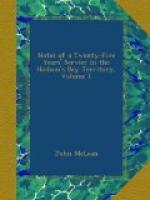The brigade from York Factory arrived with the outfit on the 2d of August, and we exchanged cargoes with the utmost expedition, they receiving the returns of the district, and we the outfit brought by them. By this conveyance I received letters from the Governor, acquainting me “that another gentleman was appointed to the charge of McKenzie’s River District, and that he (the Governor) could not conceive on what grounds I fancied myself to be the person so appointed, as he was certain I could not have arrived at such a conclusion from perusing the instructions I had received from him last year!” Until now I thought I understood the English language as well as most people; but the Governor makes it appear plainly enough that I ought still to confine myself to the old Celtic.
The instructions above referred to being given in the foregoing pages, I shall leave the reader to form his own opinion of one who, in the high and honourable position of a Governor, could treat so ungenerously one whom he admitted to be a faithful and meritorious servant, and whom he had acknowledged to be deserving of preferment: and that not on the present only, but on several former occasions.
This last insult I consider the climax to the wrongs I have so long suffered. First I am appointed in the usual terms to the charge of a district. I am allowed to continue in that opinion for a twelvemonth; I enter into correspondence with the gentlemen of the district as their future superintendent, and make my arrangements with them as such; and, au bout du compte, am ordered back to the same district to mix with the crowd, and submit to another master. I leave it to the reader to judge whether such a Governor could possibly have the interests of the Company at heart; even supposing for a moment there were no injustice in the case; I leave it to him to consider what effect a conduct and measures so vacillating, unsteady and arbitrary, are likely to have on the service and interests of the Company.
This last act of the Governor made me completely disgusted with a service where such acts could be tolerated. In no colony subject to the British Crown is there to be found an authority so despotic as is at this day exercised in the mercantile Colony of Rupert’s Land; an authority combining the despotism of military rule with the strict surveillance and mean parsimony of the avaricious trader. From Labrador to Nootka Sound the unchecked, uncontrolled will of a single individual gives law to the land. As to the nominal Council which is yearly convoked for form’s sake, the few individuals who compose it know better than to offer advice where none would be accepted; they know full well that the Governor has already determined on his own measures before one of them appears in his presence. Their assent is all that is expected of them, and that they never hesitate to give. Many years pass without such a thing as a legally constituted Council being held. A legal Council ought to consist of seven members besides the Governor; three chief factors and four chief traders. The Council, however, seldom consists of more than five members and the Governor.




